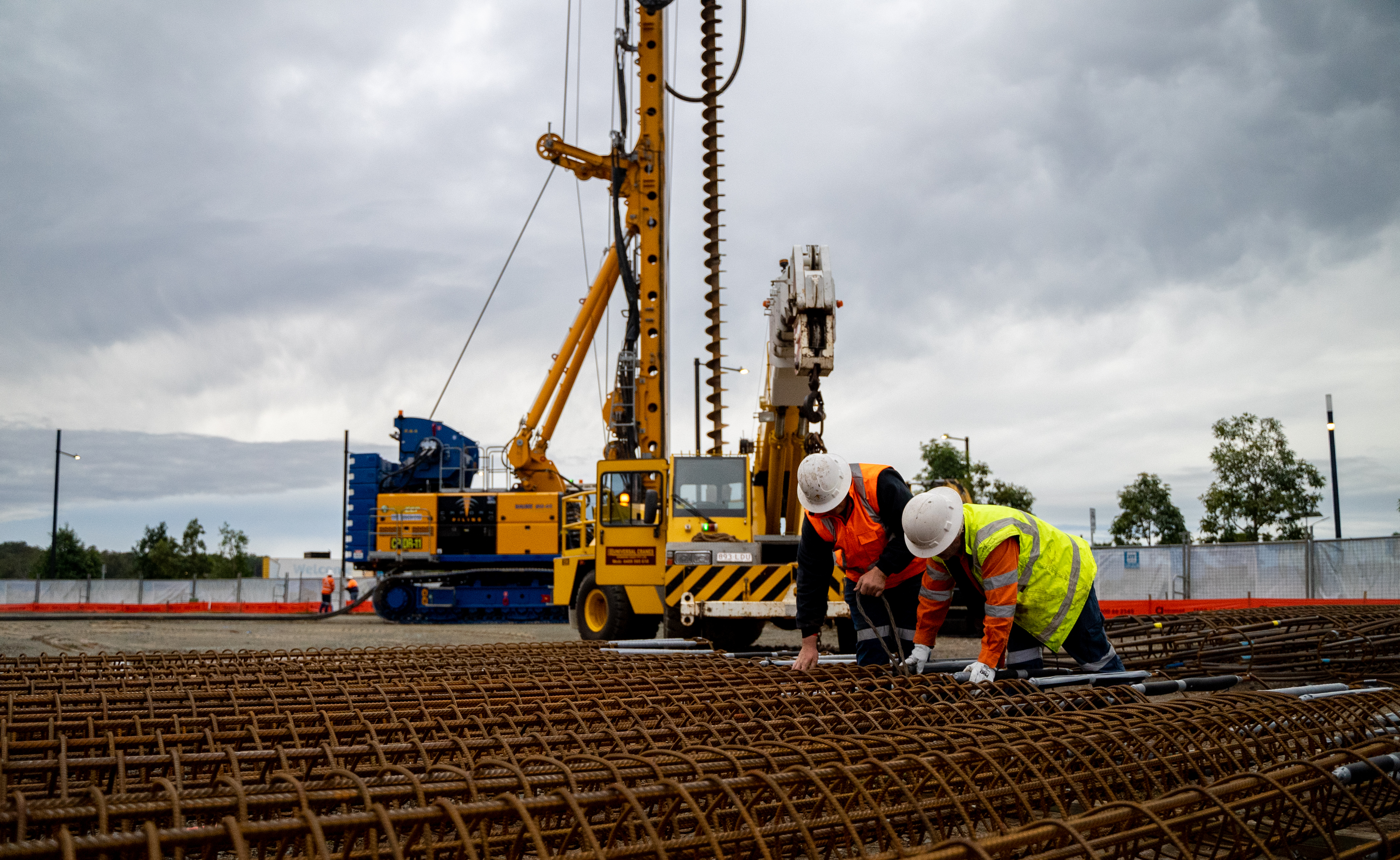The biggest and newest rotary drilling rig of its type in Australia has started boring 26 metres below ground, kicking off the second stage of expansion at the University of the Sunshine Coast’s Moreton Bay campus.
Weighing 170 tonnes, standing 43 metres high and worth $3million, the Bauer BG 45 PremiumLine has arrived at Petrie to lay the foundations for stage two of the campus, which opened in 2020.
It is the biggest continuous flight auger (CFA) rig in the country. CFA is a rotary drilling method that uses a hollow stemmed tool to dig the hole and then pump in the concrete.
UniSC Vice-Chancellor and President Professor Helen Bartlett said growth at the Moreton Bay campus had exceeded expectations and three new buildings would give students additional state-of-the-art facilities for studying, collaborating and socialising.
“Moreton Bay is one of Australia’s fastest-growing regions, with an enormous number of innovative companies and industries, and UniSC is well positioned to help graduates find and create careers in their own backyard,” Professor Bartlett said.
“When stage two is complete, UniSC will have invested more than $200 million into infrastructure at the Moreton Bay campus in The Mill at Moreton Bay precinct since initial works started in 2018.”
She said students and staff would be excited to see construction company BADGE start work this week, weather permitting.
Mayor of the Moreton Bay Region Peter Flannery said UniSC had already opened the door for hundreds of local students to study in their own backyard with many of them becoming the first in their family to attend university.
“When Council first devised a plan to get our very own greenfield university campus in the heart of Moreton Bay, we had some of the lowest tertiary education rates in the country and the site itself resembled something like a swamp,” Mr Flannery said.
“Thanks to a lot of hard work and help from UniSC, the Federal Government and many others, we were able to turn this dream into a reality and create one of the best new university campuses in Australia.
“Just two years into this campus’s life and, incredibly, we are well ahead of our expectations for growth, which is testament to the hunger of locals for higher education in Moreton Bay.
“We are one of the fastest growing regions in Australia so we need the best facilities to ensure our residents and their children can aspire to be whatever they want to be, and to have the option of obtaining a tertiary degree right here in Moreton Bay without having to drive or leave the region.”
More than 60 undergraduate degrees are already offered across Business, Education, Health, Science, Technology, Engineering, Biomedical Science and Social Work.
Stage 2 design and build
The expansion has been designed by Brisbane-based architectural practice KIRK. Each of the three buildings will comprise three storeys, with the tallest 19 metres, bringing the total floor space on campus to 28,500 square metres.
A BADGE spokesperson said the big rig would drill reinforced steel concrete pilings (long poles) into the ground as foundations to structurally support the buildings. More than 160 trucks’ worth of concrete will fill the piling holes.
He said engineers were looking forward to working with the new machinery, which had to be assembled on site after coming in parts from contractor Caporn Piling at Narangba.
Bauer is a seventh-generation family-run company that originated in Germany and now has 100 branches around the globe manufacturing high-quality, high-performance machinery.
Stage two of the Moreton Bay campus will include teaching and learning spaces, research laboratories, an industry hub and event space, student gym and sports hall, sports science facility, student hub and breakout spaces, outdoor spaces and amenities as well as multi-level parking.
With its student population expected to reach 10,000 students by 2030, the campus will become landmark infrastructure for The Mill at Moreton Bay, which Moreton Bay Regional Council has planned as a sustainable, mixed-use community for residents, students, businesses and industries, and visitors.
The foundation building, which opened in 2020, recently earned an Australian Institute of Architects Education Award at the Queensland Architecture Awards.
Stage two is scheduled for completion in mid-2023.
Media enquiries: Please contact the Media Team media@usc.edu.au

